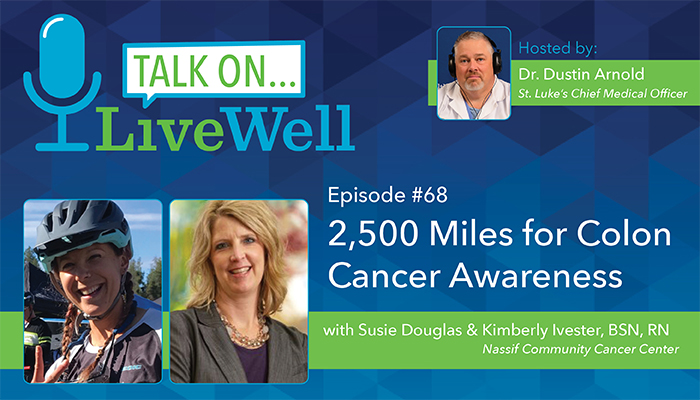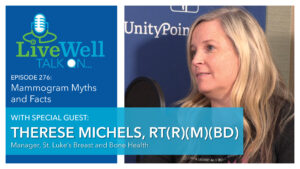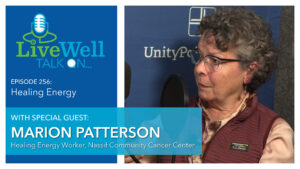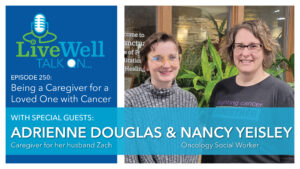Susie Douglas talks about her 2,500 Miles for Colon Cancer Awareness campaign. Also, Kimberly Ivester, director at the Community Cancer Center, discusses colon cancer trends, signs and symptoms.
Subscribe on: Apple Podcasts | Google Podcasts | Spotify | iHeart Radio | Pandora | SoundCloud | Stitcher | TuneIn
Host
Dr. Dustin Arnold
Chief Medical Officer
UnityPoint Health – St. Luke’s Hospital
Guests:
Susie Douglas
Riding 2,500 Miles for Colon Cancer Awareness
Kimberly Ivester
Director
Helen G. Nassif Community Cancer Center
Transcript
Dr. Arnold:
This is LiveWell Talk On…2,500 Miles for Colon Cancer Awareness. I’m Dr. Dustin Arnold, chief medical officer at UnityPoint Health – St. Luke’s Hospital. It’s always been a privilege and pride of this broadcast to highlight the outstanding things that happen at the Helen G. Nassif Community Cancer Center. And joining me today on the phone is Susie Douglas. Last year Susie’s brother Zach was diagnosed with stage four colon cancer at just 38 years of age. Motivated by her brother’s diagnosis, Susie is biking the Great Divide between Montana to New Mexico, with the goal of raising awareness about colon cancer and young adults. 100% of donations to her campaign will go to the Helen G. Nassif Community Cancer Center to support local cancer patients. Also with me today in the studio is the boss over at the cancer center, Kimberly Ivester, director of the Nassif Community Cancer Center to discuss colon cancer signs, symptoms, and trends. Thank you both for joining me.
Kimberly Ivester:
Yes, thank you.
Susie Douglas:
Of course.
Dr. Arnold:
Like I said, we’re always impressed and proud of the podcasts we’ve done featuring Helen G. Nassif Community Cancer Center and all the services it provides, I think today will just be another highlight, but first Susie, could you give listeners some background on you and your brother and what motivated you to start this awareness campaign?
Susie Douglas:
Yeah, of course. Yeah. So my name’s Susie I’m 37 years old and last year, July of 2019, my older brother who was 38 at the time was diagnosed with stage four colorectal cancer. It came at quite a surprise. However, he did show a couple of symptoms pretty serious symptoms for a few months prior to his diagnosis with no answer until his diagnosis a few months after in July. The reason why, so I’ll give you a little bit of background on me. I am a humongous outdoor mountain biker adventure enthusiast and have been riding bikes for 10 plus years. Loved it enough that I started a mountain bike coaching business in Idaho called Down 2 Bike Project. And there’s nothing that I enjoy more than riding a bike. And so when my brother was diagnosed in July of last year, at that time, I knew there was going to be a time that I needed to do some fund raising for him because as most people are aware, it’s quite expensive undergoing cancer treatment for everybody, including the entire family. So it came to the time now where I have some time to go and ride a bike. And I asked my brother, if I could do a fundraiser for him by riding the Great Divide mountain biking trail. And he insisted that instead of doing a fundraiser for him, that I would do it for Helen G. Nassif Community Cancer Center. It has been an integral part of his healing process. His social worker has been amazing at fulfilling, helping with applications for the Dream Foundation, even just little treats and gifts that are handed to cancer patients during tough weeks when they’re in for chemo, he just been taken care of along the way. And so he really wanted this to be something that we would raise awareness for colon cancer and younger adults, as well as something to support the Community Cancer Center that helps so many Cedar Rapidians through the hardest times of their lives.
Dr. Arnold:
Well, that’s impressive. Where does it start in Montana and where does it end in New Mexico? You’re riding downhill, right? You’re going to start in Montana or,
Susie Douglas:
Yeah, I wish I was riding downhill the whole time though. That would be amazing! I’ll just give you a real brief run down of the trail. So typically the Great Divide mountain biking trail starts in, in Canada at Jasper. However, we cannot get into Canada at the moment. So we are starting in Rooseville, Montana, which is on the border of Canada and Montana, and we will bike south until we hit Antelope Wells, New Mexico. So we will be going through Montana, Wyoming, Colorado, New Mexico, yeah, 2,500 miles, 150,000 feet of elevation gain throughout the whole trip.
Dr. Arnold:
Kimberly, you know, when, when you’re training in medicine, the “if you hear hoof beats, think horses, not zebras,” that’s kind of an advice that physicians give younger physicians, but really the, the true advice is think of common presentations of medical conditions at an uncommon age. That is more likely to be the case that comes to you, that you miss and, you know, reading a little bit, hearing a little bit about Zach as prep work for this, kind of it fell into that. He had classic symptoms, just at a young age and they weren’t thinking of that early on. Colon cancer is on the rise in young adults. Is that some trends that you’re seeing as well?
Kimberly Ivester:
We do, we are seeing younger adults in the cancer center, you know, coming in for treatment coming in, you know, with the symptoms that ultimately lead to the diagnosis. The American Cancer Society has a publication out that speaks specifically to colon cancer. And one of the statistics that they have in there talks about the diagnosis and individuals under the age of 50, has increased from 6% of all overall diagnosis of colorectal cancer in 1990, to 11% in 2013. So quite a range in the years there, but that’s a pretty significant, significant jump. And of those cases 72% of them are actually younger than 40. So pretty significant in regards to the number of younger individuals that they’re seeing, you know, being diagnosed now.
Dr. Arnold:
And do you think, Kimberly, that’s some sort of familial syndrome that why this is presenting earlier? Do you think there’s some genetics here?
Kimberly Ivester:
You know, that was also talked about in that publication really about the, you know, kind of the reason for seeing these younger diagnosises and, you know, it really, really is unknown right now, obviously lots of studies going on, you know, out there to monitor this and to kind of follow these individuals. But really what they’re looking at is the increase in the sedentary lifestyle, higher prevalence of obesity, unfortunately in younger populations. And then kind of even going back a little further, looking at the dietary patterns of children and really young adults just in, you know, the American way of eating, unfortunately.
Dr. Arnold:
Yeah, high processed foods, less fiber.
Kimberly Ivester:
Yeah, absolutely. And I do think genetics plays a little bit of role in that. It’s hard to know where that falls in because we just do more genetic testing now than we used to and know more about genetics. So it might’ve always kind of been there, but we’re just learning a lot more about it right now.
Dr. Arnold:
Now it’s probably just a easy to assume or a presumption of what the symptoms are, but can you go through the signs and symptoms that a young person might have that would represent colon cancer?
Kimberly Ivester:
Yeah, most of the times they’re presenting with unintended weight loss. So obviously that’s something that you really have to talk through with that individual, because there is individuals out there that are trying to become healthier and trying to lose weight, but it’s really the unintended or unexpected weight loss. Decrease in appetite. So that is definitely something, I mean, we are, we’re all, you know, social people and eating is part of our, you know, social lives. So decrease in appetite. And then, you know, some of the more common ones are blood in the stools, you know, darkening of stools and then any kind of variability in constipation diarrhea. And a lot of times that’ll kind of go back and forth, you know, for those individuals, which, you know, shouldn’t, shouldn’t be something that somebody lives with, you know, for an extended period of time without getting it looked into.
Dr. Arnold:
Right. And so easy to pick up with a colonoscopy. I mean, we’ll, we’ll have Dr. Abramson back March Colon Cancer Awareness Month as we do. But you know, his presentation, is always very clear that colonoscopy done at the right time can lead to the right outcome. That being said with screening normally recommended at the age of 50. Now that since younger people are having this or the recommendations changing?
Kimberly Ivester:
You know, we haven’t seen any change. New guidelines come out with definite younger recommendations, a couple of them that we have seen, they’re starting to put the younger recommendations and tying it to that genetic link with the families, the Lynch Syndromes other things like that, polyps in the families and so forth is a big one for starting sooner. I don’t think it’ll be that far though that these guidelines are going to start looking at this just even based on that statistic of, you know, doubling over that year, those year time-frame in regards to those being diagnosed. Cause I’m sure it’s not just in our community that we’re seeing them that that’s across the board. So…
Dr. Arnold:
And you know, much like the ultrasound screenings at the, you know, the, the mobile ultrasound van that pulls up, physicians always been leery of pathology would get missed and wouldn’t be followed up. Same things kind of happen with the Cologuard and the fit test, these noninvasive stool tests. You know, if you, they miss a certain number of polyps, they miss a certain number of cancers, you know? And so there’s always that concern that that’s going to be missed too. And no matter how often you say people shouldn’t be afraid of the prep for a colonoscopy. I mean it’s, it’s not something that you want to do every weekend, but it’s, it’s not the end of the world either.
Kimberly Ivester:
Sure. Yeah. It’s tough. I mean, anytime you have to prep or, you know, that involves you know, fasting or things that you’re normally, you know, not used to, it’s definitely hard, but you know, like you said, it’s, you know, it’s, it’s better to have it done go through at once and then have that, you know, reassurance you know, that there isn’t anything wrong. Cause at the end of the day, the colonoscopy is the best way to predict or to, to catch something early. And I think that’s the big, you know, that’s the other big message here is colon cancer is very treatable, you know, if caught early, but you know, when you catch it late or catch it, you know, like, unfortunately in Zach’s, you know, experience with, you know, catching it too late, that it’s already metastasized, you know, that changes, it changes your whole treatment, you know, treatment plan and you know, everything with it.
Dr. Arnold:
Right. That’s, you know, from my 25 years in medicine, but you’ve seen the advances in colon cancer had been really.
Kimberly Ivester:
Yeah, absolutely. Yup. Yeah.
Dr. Arnold:
Susie, how can our listeners follow your journey from Montana to New Mexico?
Susie Douglas:
Yeah. Listeners can please follow me on Instagram. It’s susie_douglas_mtb on Instagram. So you can follow me there. susie_douglas_mtb on Instagram, I’ll be telling a lot of stories in more pictures there there’s also a blog that I’m going to be updating as much as possible, and that is bikingforcancer.wordpress.com, bikingforcancer.wordpress.com. And on both of those areas, they’ll be a call-to-action page where people will be able to donate to the Helen G. Nassif Community Cancer Center.
Dr. Arnold:
Well, outstanding. Well we should give a report or have another follow-up podcast on how your journey went and report a bunch of good news at that time. Thank you both for joining me today. Again, that was Susie Douglas, who’s biking 2,500 miles for colon cancer awareness and Kimberly Ivester, director at the Nassif Community Cancer Center. To learn more about the 2,500 Miles for Colon Cancer Awareness Campaign or to contribute visit communitycancercenter.org/2500miles. That’s two five zero zero miles. Thank you for listening LiveWell Talk On… If you enjoyed this episode, don’t forget to subscribe. And if you want to spread the word, please give us a five star review and tell your family, friends, neighbors, strangers about our podcasts. We’re available on Apple Podcasts, Spotify, Pandora, or wherever you get your podcasts. Until next time, be well.







